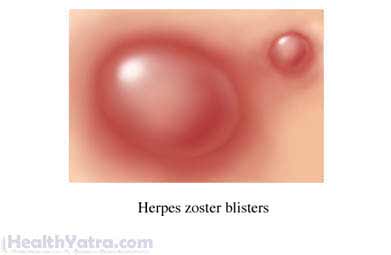Definition
Shingles is a painful infection of the nerves and skin.
Causes
It is caused by the varicella zoster virus. This is the same virus that causeschickenpox. Shingles occurs in people who have had chickenpox. After causing the first chickenpox infection, the virus is not totally eliminated from the body. Some of the remaining virus settles in nerve roots near the spinal cord. Once reactivated, the virus travels along nerve paths to the skin. There it causes pain and a rash.

Risk Factors
Factors that may increase the risk of shingles include:
- Age: 50 or older
- Gender: Women may be more likely to develop shingles.
- Compromised immune system (eg, HIV, lymphoma, leukemia)
- Radiation therapy
Shingles can occur in those with no known risk factor.
Shingles is not usually transmitted from one person to another. But, a person who has never had chickenpox and never received the varicella vaccine is likely to get chickenpox if he came in prolonged contact with a person who has shingles. Covering shingles sores with a bandage reduces the risk of transmitting shingles to others.
Symptoms
Symptoms may include:
- Rash:
- Is red and has a slightly raised band or patch often with multiple small fluid-filled blisters (blisters dry out and crust within several days)
- Develops on one side of the body, but typically does not cross the midline
- Spreads to multiple parts of the body
- Affects mostly the torso and face
- Affected eyes (in severe cases), which can seriously threaten vision
- Sensitivity and pain on the skin at the site of the rash (may be severe)
- Tingling or itchiness on the skin (may start a few days before the rash)
- Fever
- Headache
- Tiredness
The rash usually disappears within three weeks. In some cases, though, post-herpetic neuralgia (PHN) develops. With PHN, the pain continues for months or even years after the rash has healed. PHN can be severe and difficult to treat.
Diagnosis
The doctor will ask about your symptoms and medical history. A physical exam will be done. Your doctor can diagnose the rash by its appearance. Fluids may be drawn from the blisters for testing, but this is not done very often.
Treatment
Shingles cannot be cured. Treatment focuses on:
- Easing symptoms
- Speeding recovery
- Preventing PHN
Home Remedies and Over-the-Counter Products
Your doctor may recommend that you use these treatments to reduce discomfort:
- Calamine lotion
- Wet compresses
- Frequent oatmeal baths
- Over-the-counter pain relievers (eg, acetaminophen, ibuprofen, and naproxen, Capsaicin cream)
If you are not getting any relief from the over-the-counter products, your doctor may prescribe medicine. For example, your doctor may prescribe a short course of oral steroid medicine (eg, prednisone).
Antiviral Medication
Certain antiviral medicines may control shingles by changing how the virus reproduces in nerve cells. Examples include:
- Acyclovir (Zovirax)
- Famciclovir (Famvir)
- Valacyclovir (Valtrex)
Antiviral therapy may shorten a shingles episode. But you must start it within 48-72 hours after symptoms first develop.
Treatment for Post-herpetic Neuralgia
If you develop PHN, your doctor may recommend:
- Tricyclic antidepressants
- Selective serotonin reuptake inhibitor (SSRIs)
- Gabapentin (anti-seizure medicine)
- Prescription pain medicine (eg, long-acting opiates, pregabalin)
- Capsaicin cream
- Lidoderm patch
- Nerve blocks
- Transcutaneous electrical nerve stimulation (a device that generates low-level pulses of electrical current on the skin’s surface)
Prevention
The herpes zoster vaccine (Zostavax) is recommended for people aged 60 years and older. The vaccine decreases the likelihood of getting shingles and reduces the severity of PHN if shingles does occur.
If you do have shingles, take these steps to prevent giving chickenpox to others:
- Keep all blisters covered with a bandage until they are dry and crusted over.
- If you are a healthcare worker, do not return to work until the blisters are dry and crusted over.
- Avoid contact with people who are at risk to getting severe varicella, such as:
- Pregnant women
- Premature infants
- People who have a compromised immune system (eg, cancer, HIV)
